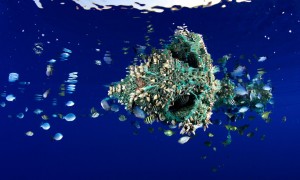 Message from the Gyre – Chris Jordan
Message from the Gyre – Chris Jordan
Plastic fragments in the world’s oceans are insidious killers which are steadily claiming an increasing number of bird and marine life every year.
But on the New South Wales north coast, a small group of scientists and volunteers are leading a campaign to reverse the trend in the local area. Every week, up to a dozen sick or injured seabirds are brought to the Australian Seabird Rescue Centre in the town of Ballina, where staff try to nurse them to better health.
“It’s a horrific death for a bird to starve or dehydrate or a combination of both,” Marine ecologist Jann Gilbert said. “The bird’s got no way of being able to regurgitate the plastic or move it through. Imagine being out in the middle of the ocean, slowly starving and dying of thirst.”
The increase in plastic ingestion seen at the Centre correlates with a CSIRO-led global report that paints a worrying outlook for the world’s seabird species.
The study estimated that 60 per cent of the world’s seabird species are already ingesting plastic, but by 2050, 99 per cent of species will be affected.
Chris Wilcox from the CSIRO’s Marine and Atmospheric Research Centre in Hobart co-authored of the report. “It’s basically driven by the fact that plastic production is increasing exponentially,” Mr Wilcox told ABC’s 7.30 Report. “Every 11 years we make as much plastic as we’ve made in the entire time since it was invented. The birds are basically tracking that pattern.
“The world has lost about 60 per cent of the seabird populations that we had in 1950. Plastics is probably one of the main contributors to that.”
Re-post: Scientists, volunteers campaign against plastics killing marine life | ABC 7.30